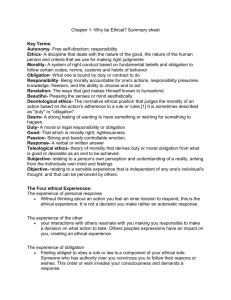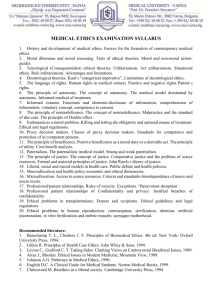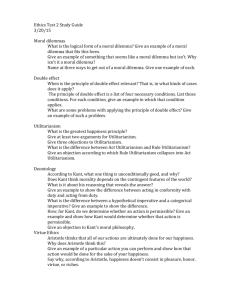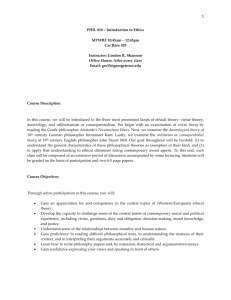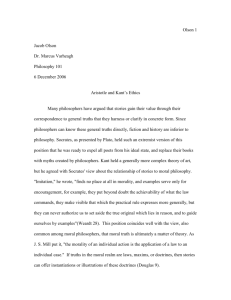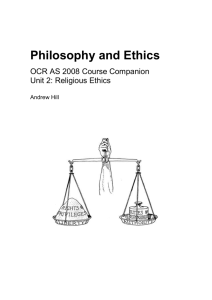Syllabus PHL 220H Fall 2013 - UP Wordpress | | UP Wordpress
advertisement
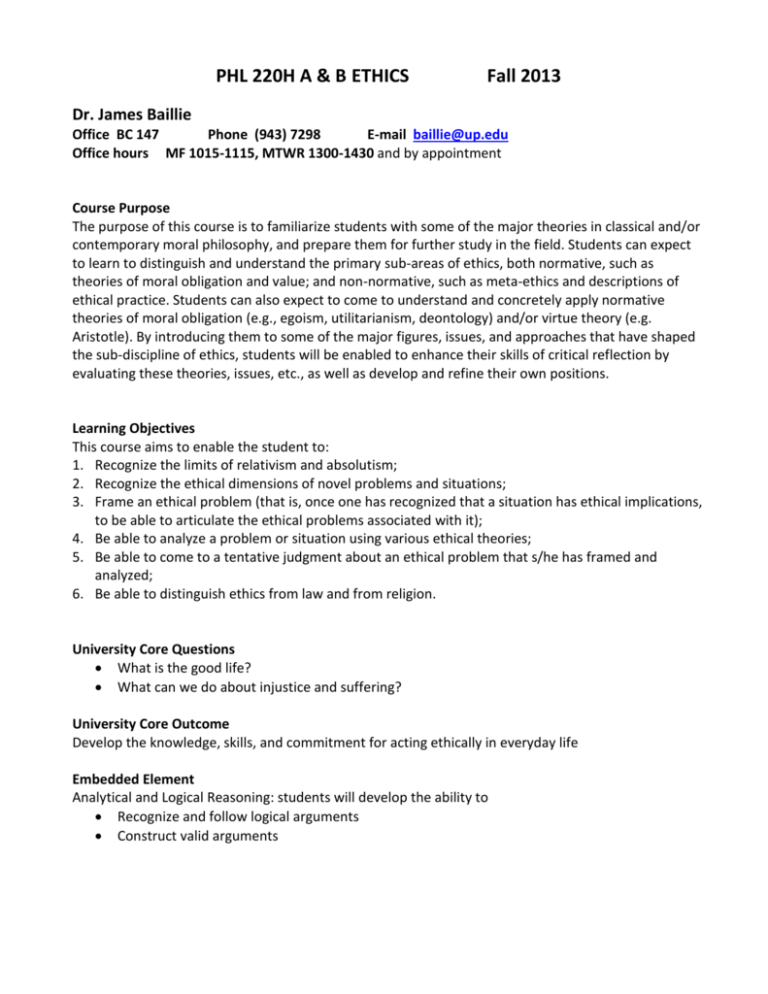
PHL 220H A & B ETHICS Fall 2013 Dr. James Baillie Office BC 147 Phone (943) 7298 E-mail baillie@up.edu Office hours MF 1015-1115, MTWR 1300-1430 and by appointment Course Purpose The purpose of this course is to familiarize students with some of the major theories in classical and/or contemporary moral philosophy, and prepare them for further study in the field. Students can expect to learn to distinguish and understand the primary sub-areas of ethics, both normative, such as theories of moral obligation and value; and non-normative, such as meta-ethics and descriptions of ethical practice. Students can also expect to come to understand and concretely apply normative theories of moral obligation (e.g., egoism, utilitarianism, deontology) and/or virtue theory (e.g. Aristotle). By introducing them to some of the major figures, issues, and approaches that have shaped the sub-discipline of ethics, students will be enabled to enhance their skills of critical reflection by evaluating these theories, issues, etc., as well as develop and refine their own positions. Learning Objectives This course aims to enable the student to: 1. Recognize the limits of relativism and absolutism; 2. Recognize the ethical dimensions of novel problems and situations; 3. Frame an ethical problem (that is, once one has recognized that a situation has ethical implications, to be able to articulate the ethical problems associated with it); 4. Be able to analyze a problem or situation using various ethical theories; 5. Be able to come to a tentative judgment about an ethical problem that s/he has framed and analyzed; 6. Be able to distinguish ethics from law and from religion. University Core Questions What is the good life? What can we do about injustice and suffering? University Core Outcome Develop the knowledge, skills, and commitment for acting ethically in everyday life Embedded Element Analytical and Logical Reasoning: students will develop the ability to Recognize and follow logical arguments Construct valid arguments COURSE REQUIREMENTS Your grade for the course will be determined by three papers (1200 words) and two tests. Each item is worth one-fifth of your course grade. The first paper will be due around week 4. The first test will be will be before Fall break. The second paper will be due around week 10 The second test will be around week 14. The third paper will be due on Finals week. Participation: I expect you to attend and actively contribute to the class. Before each class, I expect you to keep up with the course readings so that you can participate in a meaningful manner. After each section of the course I will put the overhead notes on Moodle. Classroom etiquette is similar to "movie rules": do not cause any distraction. Treat everyone with respect. For example, when someone is speaking, give that person your attention. This means no chatting, texting, surfing the Web, or doing work for other classes. Violations of these rules risk deductions from your grade. You must be present on the scheduled date of any test or risk a grade of F for it. If you cannot be present at the time scheduled, you must make arrangements with me at least three days in advance. If you are sick on a test day, you must provide a doctor’s note confirming this. Extra credit will only be given in very special circumstances. Indiscriminate use of extra credit is a disincentive for people to commit themselves to regular coursework. It also enables them to achieve an inflated grade that does not reflect their understanding of the course. COURSE DESCRIPTION After an introductory overview, the course will begin with some metaethics, on the basis of values and moral judgments. Students should be able to critically discuss the following issue: Can God’s will provide a foundation for ethics? We then turn to value theory and normative ethics. We start with two modern theories: Utilitarianism and Kant’s deontology. These theories propose criteria of right action. We then turn to Aristotle’s virtue theory, which focuses on questions of character and the good life. Students should be able to describe and critically evaluate Consequentialism The principle of utility/greatest happiness principle Bentham’s and Mill’s versions of hedonism The utilitarian theory of justice Act- and Rule- Utilitarianism Kant’s notion of autonomy Kant’s main formulations of the categorical imperative The role of teleology in Aristotle Aristotle’s notion of eudaimonia Aristotle’s theory of virtue as a mean Aristotle's influence on Natural Law Theory We then turn to applied ethics, considering the moral issues around euthanasia/ physician-assisted suicide, and abortion. Students should be able to critically discuss the following: The Doctrine of Doing and Allowing The Doctrine of Double Effect Concepts of personhood employed in these debates Concepts of rights employed in these debates Appeal to autonomy and sentience in these debates Thomson’s pro-choice argument Marquis’s anti-abortion argument Finally, (if we have time) we return to metaethics. Students should be able to come to informed judgments on the following issues: Do moral judgments have an objective basis, or are they merely matters of opinion? Are there universally applicable moral rules, or is morality a variable set of social customs? READING Text Russ Shafer-Landau, The Fundamentals of Ethics ‘RSL’ refers to Shafer-Landau. ‘W’ means Word file posted on Moodle. PDF files will also be posted on Moodle. ‘O’ are online. Introduction RSL Introduction Divine Command Theory RSL Ch. 5; p. 328-330 Utilitarianism RSL Chs. 1, 2 (on hedonism); 9, 10 (on consequentialism) Quotations from Bentham, Mill, Nozick W Kant RSL chs. 11, 12 Michael Sandel, “What Matters is the Motive: Immanuel Kant” PDF Quotations from Kant W Aristotle Richard Kraut “Aristotle’s Ethics” http://plato.stanford.edu/entries/aristotle-ethics/ sections 2, 4, 5 O RSL Ch. 17 Quotations from Aristotle W Doing v Allowing; Double Effect RSL Ch. 15 Euthanasia & Physician Assisted Suicide Helga Kuhse, “Euthanasia” PDF Walter Glannon, “Medical Decisions at the End of Life” PDF Abortion John Harris and Soren Holm, “Abortion” PDF Judith Jarvis Thomson “A Defense of Abortion” (excerpts) W Don Marquis “Why Abortion is Immoral” (excerpts) W Ethical Relativism and Objectivism RSL Ch. 19; p. 320-328 Chris Gowans, "Moral Relativism", http://plato.stanford.edu/entries/moral-relativism/ O Further readings will be assigned for papers. UNIVERSITY POLICIES AND RESOURCES University of Portland’s Code of Academic Integrity Academic integrity is openness and honesty in all scholarly endeavors. The University of Portland is a scholarly community dedicated to the discovery, investigation, and dissemination of truth, and to the development of the whole person. Membership in this community is a privilege, requiring each person to practice academic integrity at its highest level, while expecting and promoting the same in others. Breaches of academic integrity will not be tolerated and will be addressed by the community with all due gravity. Assessment Disclosure Statement Student work products for this course may be used by the University for educational quality assurance purposes. Disabilities Statement If you have a disability and require an accommodation to fully participate in this class, contact the Office for Students with Disabilities (OSWD), located in the University Health Center (503-943-7134), as soon as possible. If you have an OSWD Accommodation Plan, you should make an appointment to meet with me to discuss your accommodations. Also, you should meet with me if you wish to discuss emergency medical information or special arrangements in case the building must be evacuated. The Learning Resource Center The Learning Resource Center, in Franz 120, houses the Writing Center. The Writing Center is open by appointment and supports professors and students as they write across the disciplines. Appointments are made electronically. To schedule an appointment, go http://www.up.edu/lrc/writing/ and click on ‘Appointments’ to sign in and view the schedule.



